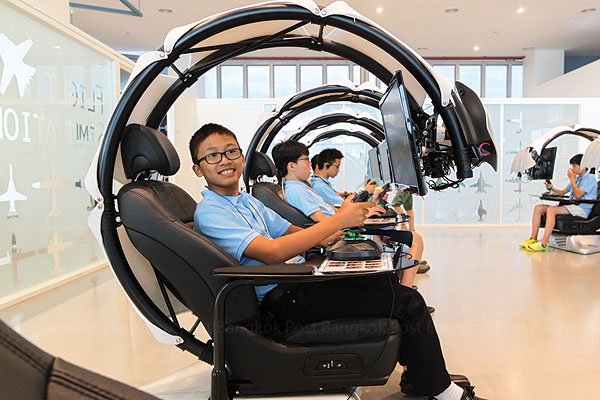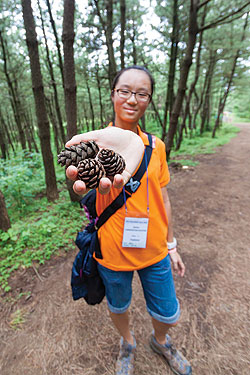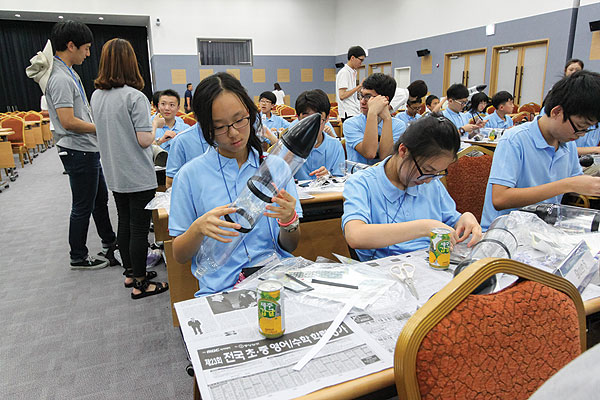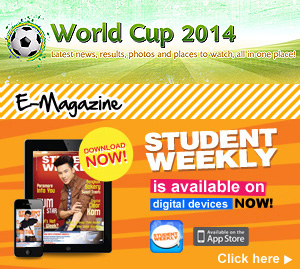
Thai teens go galactic in Korea
By Suwitcha Chaiyong
Photos courtesy of Chevron Thailand
Did you know
Mars is named after the ancient Roman god of war.
To inspire Thai students to learn about science and space, Chevron Thailand and the National Science and Technology Development Agency selected six students to attend the International Space Camp, which was held recently at the Jeju Aerospace Museum on Jeju Island in South Korea.
Suankularb Wittayalai School student Pittayuth Yoosiri (Poom), 13, and 14-year-old International School Bangkok student Janita Luanpolcharoenchai (Janie) were two of six Thai students who attended the camp in July. The students said that they applied to take part in the camp because they were interested in space.
“I’m interested in astronomy and space, so this was a great opportunity for me to learn more about it,” Poom said. “By learning about astronomy and space, we can understand the universe better.”

MODERN MUSEUM
During their three days on Jeju Island, the young Thai participants took part in lots of activities with new friends that they met from Bangladesh, China, Japan, South Korea and Vietnam.
Touring around Jeju Aerospace Museum was the highlight of the trip for Poom and Janie. The museum has lots of interactive exhibitions that cover subjects ranging from the history of aviation to modern space technology. Both Poom and Janie had a ball at the museum, especially with the interactive exhibits.
“The exhibitions weren’t boring at all because we could interact with them,” Poom said. “I particularly liked the flight simulator, which was a computer with a joystick that we used to control an aeroplane so that we could learn how to fly.”
A PLACE IN SPACE
Several activities were organised to get the students more interested in space and rockets. For one activity, the students launched their own small water bottle rockets.
“I wasn’t interested in rockets before the camp, but we learned how to launch our own rocket and calculate its flight to hit a target,” Janie said. “It was fun, and it wasn’t difficult at all because the staff clearly explained how to do it.”
The students also discussed different aspects of space travel, such as how humans can live once they leave Earth and how to get rid of rubbish in space. Poom enjoyed trying to come up with new ideas during the discussions.
“I’d never thought about how people could live in space, but our group discussed the topic and about how people could live on the moon or on Mars,” Poom said. “All of the activities made me understand more about space travel.”

FRIENDLY CAMP
Aside from learning about science and space, the participants made lots of new friends and learned more about different cultures at the camp. On the last day, students from every country held cultural performances. The Thai students dressed up in folk costumes and performed some traditional Thai dances.
“The Korean participants performed K-pop dances, which was interesting because we got to see some of their pop culture,” Janie said. “I also noticed that a Korean friend always used chopsticks to pick up everything during meals. It was great seeing little aspects of different culture like that.”
Poom was particularly happy to make some new friends.
“It was great to meet Thai and international students who have similar interests, especially to make friends with people who are interested in space,” Poom said. “I’m happy to keep in touch with them and share our interests together.”
Vocabulary
-
aerospace (n): the industry of building aircraft and vehicles and equipment to be sent into space
astronomy (n): the scientific study of the sun, moon, planets, stars, etc.
interactive (adj): that allows information to be passed in both directions between a computer, an exhibit, etc. and the person using it
aviation (n): the designing, building and flying of aircraft
flight simulator (n): a device that reproduces the conditions that exist when flying an aircraft, used for training pilots
joystick (n): an upright handle in an aircraft that is used to control direction or height; a handle used with some computer games to move images on the screen
rocket (n): a spacecraft in the shape of a tube that is driven by a stream of gases let out behind it when fuel is burned inside
calculate (v): to use numbers to find out a total number, amount, distance, etc.
pop culture (n): the music, TV, cinema, literature, etc. that are popular and enjoyed by large sections of mainstream society at a particular time
aspect (n): a particular part or feature of somethingIdiom
keep in touch: to communicate with somebody, especially by telephone, writing or the Internet


